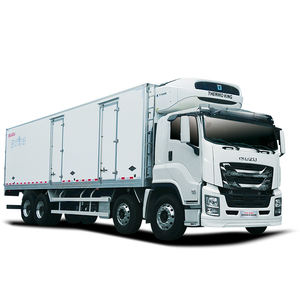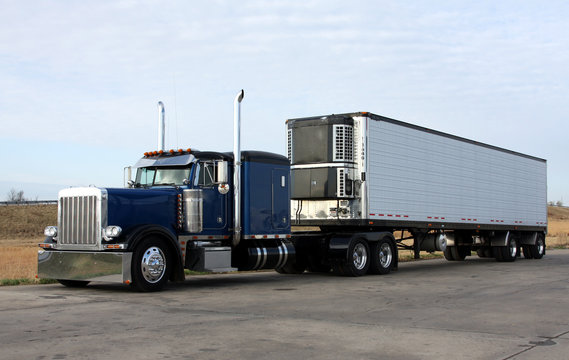Picking the Right Transport Refrigeration System for Your Fleet
Choosing a proper transport refrigeration system for your fleet is a vital decision that can significantly influence functional performance and item stability. It necessitates a thorough understanding of your details refrigeration requirements, including temperature level demands and shipment schedules.
Recognizing Your Refrigeration Demands
When picking a transport refrigeration system, understanding your specific refrigeration needs is critical to making sure item top quality and conformity with market standards. Numerous elements have to be taken into consideration to establish one of the most appropriate system for your operation. These consist of the type of products being transported, their temperature level needs, and the duration of transit.
For disposable goods, such as fresh produce or drugs, specific temperature level control is important. Comprehending the temperature range required for every product allows for the option of a system that can preserve those conditions consistently. Additionally, take into consideration the regularity of shipments and the distance took a trip; longer trips might necessitate systems with boosted insulation or back-up power choices to stop temperature level variations.

Moreover, the capacity of the refrigeration system need to straighten with your load size. Overwhelming a system can bring about not enough cooling, while an oversized system may be pricey and inefficient. Regulative conformity is necessary; acquaint on your own with international and local guidelines governing the transport of temperature-sensitive products. By completely examining these aspects, you can make sure that your selected transport refrigeration system efficiently meets your operational demands and keeps item stability.
Kinds Of Transport Refrigeration Systems
Picking the ideal sort of transport refrigeration system is critical for ensuring the risk-free transit of temperature-sensitive items. There are a number of systems available, each made to fulfill specific needs and applications.
These systems are often preferred for their efficiency and lower first prices. Another choice is the main refrigeration system, which serves several areas or vehicles from a single compressor device.
Additionally, there are self-contained refrigeration devices that integrate the compressor and evaporator in one plan. These units are suitable for smaller sized vehicles or when area is restricted. For specialized applications, such as carrying perishables or drugs, cryogenic refrigeration systems might be made use of, using liquid nitrogen or carbon dioxide to preserve ultra-low temperatures.
Finally, crossbreed refrigeration systems that incorporate diesel and electric power are becoming progressively preferred, supplying flexibility in energy use and decreasing environmental impact. Comprehending these different types enables fleet operators to make educated decisions customized to their particular functional requirements.
Secret Functions to Think About
Exactly how can one make sure that a transport refrigeration system satisfies all operational requirements? To achieve this, several key features have to be carefully evaluated. Temperature control is vital; systems must use accurate temperature setups to fit various items, varying from iced up products to subject to spoiling items.
Energy performance is one more vital consideration, as it affects operational costs. Search for systems that utilize advanced modern technology, such as variable speed compressors, to optimize energy usage without jeopardizing efficiency.
Another feature to examine is the reliability and durability of the devices. Systems created from top notch materials and made for durability versus severe problems will lower maintenance costs and downtime.
Moreover, the convenience of maintenance and access of components can dramatically influence functional efficiency (reefer trucks thermo king). Features like modular styles or remote surveillance capacities can improve solution reefer trucks thermo king processes
Finally, compatibility with existing fleet monitoring software can improve monitoring and reporting procedures. By focusing on these essential attributes, fleet drivers can ensure that their transport refrigeration systems not only fulfill current demands however additionally adjust to future needs.

Budgeting for Refrigeration Solutions
Reviewing crucial functions of transport refrigeration systems is just one component of guaranteeing operational performance; budgeting for refrigeration options is equally vital. A well-structured budget plan not only incorporates the preliminary purchase cost but additionally thinks about long-term functional prices, consisting of energy usage, maintenance, and possible repair work demands.
When establishing a spending plan, fleet managers should first assess the overall cost of ownership (TCO) This consists of not only the procurement costs however also ongoing expenditures connected to sustain performance and the sturdiness of the refrigeration devices. Picking systems with greater energy performance ratings might generate considerable financial savings in time, minimizing upfront expenses.
Moreover, fleet operators must account for prospective scalability. As organizations grow, the refrigeration needs might alter, demanding upgrades or additional units. Planning for these future expenditures can prevent financial stress.
Funding alternatives can also play a critical role in budgeting. Leasing, fundings, or straight-out acquisitions each have distinctive financial implications, and comprehending these can assist in making an educated choice. Ultimately, a detailed spending plan that considers both immediate and future requirements makes sure that transportation refrigeration systems contribute positively to the overall functional efficiency of the fleet.
Maintenance and Support Options
In the realm of transport refrigeration systems, effective upkeep and assistance alternatives are critical for guaranteeing optimal performance and long life. Routine upkeep is necessary to protect against failures and maintain the honesty of temperature-sensitive cargo. It is advisable to develop a routine assessment timetable with qualified professionals who can perform required checks and repair services on refrigeration units.
Support choices need to consist of a durable solution arrangement, covering both regular upkeep and emergency repairs. This makes sure that your fleet has accessibility to trigger aid, decreasing downtime and maintaining functional effectiveness. Many makers provide extensive support plans that include training for your staff, allowing them to carry out basic troubleshooting and upkeep tasks.
In addition, using remote surveillance modern technology can improve your upkeep method - refrigerated transportation thermo king. These systems offer real-time information on temperature and efficiency, permitting aggressive steps prior to issues rise. Buying training and modern technology not only enhances your fleet's dependability but likewise extends the life expectancy of your refrigeration systems
Ultimately, a calculated approach to upkeep and assistance will secure your investment and make sure that your transportation refrigeration systems operate at peak effectiveness, supplying consistent outcomes for your company.

Conclusion
In conclusion, picking the suitable transportation refrigeration system for a fleet requires a thorough analysis of particular refrigeration demands, system types, and crucial functions. Additionally, cautious budgeting and preparation for future scalability will add to the long-term success of the refrigeration method.
Selecting a proper transport refrigeration system for your fleet is a vital decision that can dramatically affect functional performance and product integrity.When choosing a transportation refrigeration system, comprehending your details refrigeration needs is critical to ensuring product top quality and compliance with market standards. By extensively assessing these elements, you can make certain that your chosen transport refrigeration system successfully fulfills your functional needs and preserves item honesty.
Inevitably, a comprehensive budget plan that thinks about both prompt and future needs guarantees that transport refrigeration systems contribute positively to the general functional performance of the fleet.
In verdict, selecting the suitable transport refrigeration system for a fleet requires a detailed analysis of specific refrigeration needs, system types, and important functions.